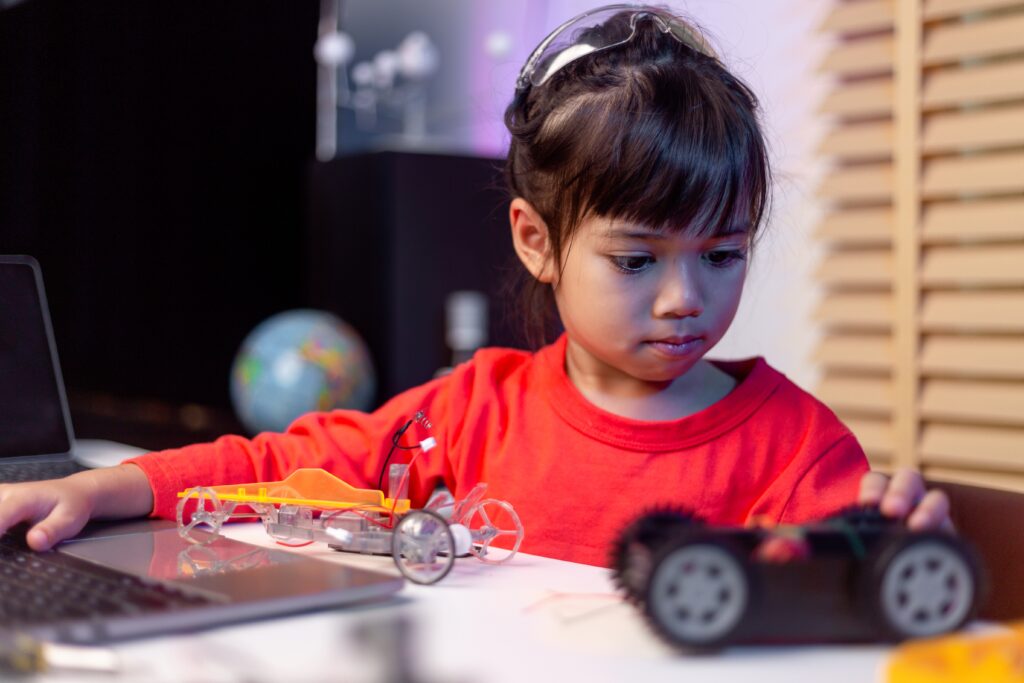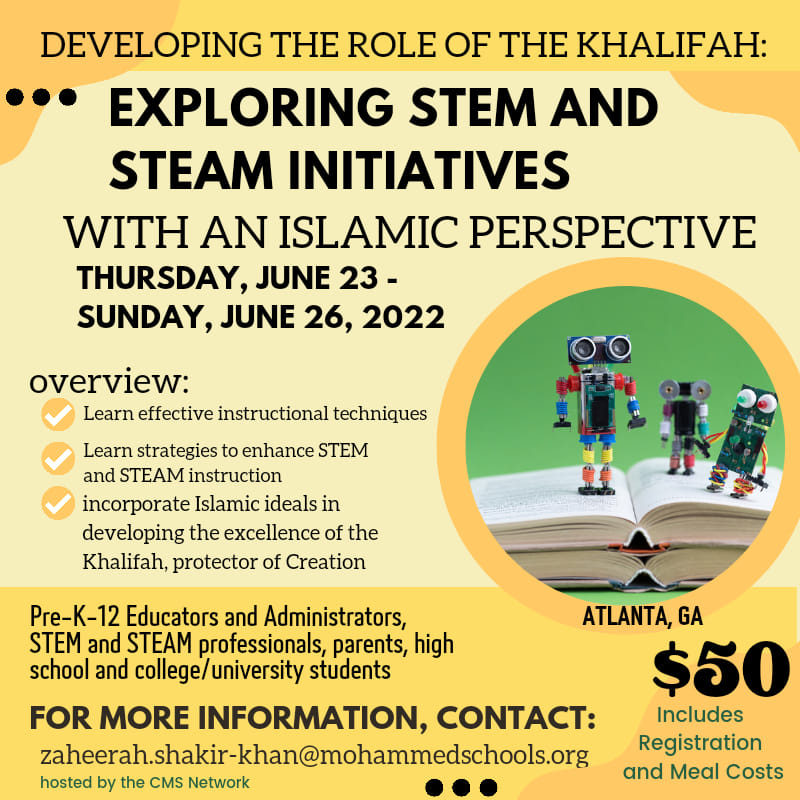Utilizing STEM and STEAM initiatives in Islamic schools

By Zaheerah Shakir-Khan
November/December
To further understand His creation, God has enabled us to use science and mathematics to grasp its full potential for our benefit. Recently, STEM (Science, Technology, Engineering and Mathematics) and STEAM (Science, Technology, Engineering, the Arts and Mathematics) initiatives have guided the development of many K-12 curriculum approaches and programs. Program certification and accreditation for these initiatives, which often feed into college and career programs of study and emphasis, can be obtained in many school districts and state educational programs. We want to encourage Islamic schools to pursue these initiatives and incorporate their practices into their curriculum offerings.
To support this endeavor and provide a Quranic perspective on doing so, the Clara Mohammed Schools Network held a “Developing the Khalifah with STEM and STEAM Initiatives from an Islamic Perspective” conference in Atlanta on June 23-34. Our goal was to provide Quranic references, instructional strategies and prophetic pedagogical tools to equip teachers to present information from a Quranic and Islamic perspective. The goal was to have students and educators begin to fully explore the sciences to discover how human beings can become the khalifa of God’s creation for the intended benefit of human society.
To achieve these immediate and long-term goals, the conference began with a keynote address by Dr. Qadir Abdus-Sabur (director, New African Ummah Online School) defining the khalifa’s role and highlighting historical events and persons that displayed this role, such as Islam’s golden age and humanity’s progress after its advent. Also emphasized was the role of human beings as individuals and as a collective society in assuming responsibility for this role. The notion of succession was explained as the need and opportunity given to every human society and each generation to continue this work.
During the conference’s work sessions, participants received strategies for implementing programs from local and national STEM and STEAM professionals. Our presenters were W.D. Mohammed High School alumni who are now professionals in their fields: Dr. Anisah Nu’Man (Spelman College), Dr. Lateefah Id-Deen (Kennesaw State University), Dr. Ayeeb Sabree (independent data analysis contractor), Dr. Macus Lambert (Cornell University and SUNY Downstate Medical School), Dr. Malikah Waajid (Center for Disease Control, Atlanta headquarters) and Ahkillah Johnson (Emory University, pre-medicine graduate). All of them provided detailed and practical information for students at all developmental and age levels. For students in the lower grades, techniques for hands-on activities with actual examples and take-home materials were offered. For middle and high school students, discussions presented benchmark assessment tools to help them understand major and key concepts. Several professionals outlined ways to uncover and prevent student misconceptions. College instructors and career professionals outlined significant milestones for instructing and acquiring mathematical and scientific concepts to help Pre-K-12 teachers support student advancement in proficiency levels.
The prophetic pedagogical strategies of teaching via storytelling, parables, questioning and reflective thinking were demonstrated in order to provide teachers with instructional methods they can use in their classrooms. Specific examples of science and math concepts and principles were provided from the Quran and Hadith. One example included a lesson on color based on “And all that He has multiplied for you in the Earth of diverse colors: verify there is a message in this for a people who recollect” (16:13). This is just one of the examples used to demonstrate that God presents many scientific and mathematical principles in the Quran.

One session comprised a middle school science program that, based on the Ascension Model, showed how it used the acronym A-STEAM (Ascending to Service through Training Environmental Stewardship, Adab and Movement). During this presentation, students demonstrated science projects based on this theme and the higher-level thinking requirements for science projects that benefit society or display natural concepts and an understanding of creation.
The concept of career pathways was introduced for all levels of instruction. All states have such pathways, which consist of courses designed to provide a background for foundational concepts in careers and the associated technologies. These career paths are designed to prepare students for college and/or technical schools. Many programs encourage students to complete a career pathway or associate degree through dual enrollment opportunities while in high school. All schools, regardless of size, should be able to implement basic technology courses, such as coding, robotics and engineering. We demonstrated how easily this can be accomplished.
The conference provided indoor and outdoor workshops to illustrate how to develop a school garden and to use the outdoors for environmental sciences. This approach was employed so that everyone could learn to look at all the instructional resources provided in God’s creation and connect them to the Quran.
Finally, participants were given resources and/or links to acquire national, state and local grants and/or resources to support their local initiatives. Information about the National Science Foundation, federal and state grant sources, as well as local nonprofit and government grants, was shared. All participants were given the responsibility to create at least one activity based on the information received to be executed in their school during this school year.
Many Quranic chapters and verses can be used as guiding principles in scientific studies. It is amazing and inspiring to study the work of Muhammad ibn Musa al-Khwarizmi (d. c. 850), al-Biruni (d. c. 850), Avicenna (d.1037), George Washington Carver (d.1943) and others who based their work on and acknowledged the presence of the Divine in developing their insights. We are blessed both with divine guidance from the revelation of the Holy Quran and by the mission of Prophet Muhammad (salla Allahu ‘alayhi wa sallam) to teach the Quran and set a life example of its teachings.
Now, with the explosion of technology, we are able to further understand and explore the creation. But must do so in a way that contributes to the benefit of human society. In our Islamic schools, how are we developing the khalifa’s role? For instance, 2:30-31states that God will place a successive “human” authority on Earth and that He taught Adam the names of all things. Our Islamic schools have the mission and purpose of becoming knowledgeable of His creation and thereafter teaching and promoting its best use for humanity.
We would like to thank Amana Mutual Funds Trust, the Islamic Schools League of America and several national mosques in Detroit, Miami, Atlanta, Charlotte (N.C.) and Nashville, as well as the generous donors and organizations from around the country, that sponsored this conference. We look forward to this becoming an annual event, one where we can deal with various academic subject areas using the beauty and breadth of the Quran as our source, Prophet Muhammad as our example and our desire to please God in our actions and work with children in our schools.
Dr. Zaheerah Shakir-Khan, an education consultant, is a retired public and private school administrator and former director of the Mohammad Schools of Atlanta.
Tell us what you thought by joining our Facebook community. You can also send comments and story pitches to [email protected]. Islamic Horizons does not publish unsolicited material.
